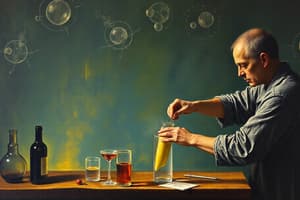Podcast
Questions and Answers
What is the primary role of the independent variable in an experiment?
What is the primary role of the independent variable in an experiment?
- It provides the basis for comparison with the control group.
- It is the variable that is changed or controlled. (correct)
- It remains constant throughout the experiment.
- It is the variable that is measured.
Which group in an experiment does not receive the experimental treatment?
Which group in an experiment does not receive the experimental treatment?
- Control group (correct)
- Variable group
- Experimental group
- Dependent group
How do producers contribute to the flow of energy in an ecosystem?
How do producers contribute to the flow of energy in an ecosystem?
- They convert sunlight into energy. (correct)
- They store energy in the form of fats.
- They consume energy from herbivores.
- They act as decomposers in the ecosystem.
Which of the following best describes a scientific law?
Which of the following best describes a scientific law?
What is the primary function of ATP in biological systems?
What is the primary function of ATP in biological systems?
Which of the following is a basic need for life?
Which of the following is a basic need for life?
A scientific theory is proven to be absolutely true and cannot change.
A scientific theory is proven to be absolutely true and cannot change.
What is the role of decomposers in an ecosystem?
What is the role of decomposers in an ecosystem?
Carbohydrates include simple sugars that end in '_______'.
Carbohydrates include simple sugars that end in '_______'.
Match the following groups of living things with their descriptions:
Match the following groups of living things with their descriptions:
Flashcards are hidden until you start studying
Study Notes
Scientific Method
- The scientific method is a systematic process used to investigate and understand the natural world.
- It involves five steps: observation, hypothesis, experiment, analyze data, and conclusion.
Variables
- Independent variable is the factor that is changed or manipulated in an experiment.
- Dependent variable is the factor that is measured and is affected by the independent variable.
Groups
- Control group does not receive the experimental treatment and serves as a baseline for comparison.
- Experimental group(s) receive the experimental treatment.
Scientific Concepts
- Scientific theory is a well-substantiated explanation of some aspect of the natural world, supported by evidence from multiple independent sources.
- Scientific law is a statement based on repeated experimental observations that describes a fundamental aspect of the natural world.
- Theories can provide the foundation for scientific laws, as they explain the underlying principles that lead to observed phenomena
Basic Needs for Life
- All living organisms require certain basic necessities for survival:
- Water is essential for cellular processes and maintaining bodily fluids.
- Air provides oxygen for respiration and carbon dioxide for photosynthesis.
- Shelter provides protection from the elements and predators.
- Food provides energy and nutrients for growth and maintenance.
Categories of Living Things
- Living organisms are categorized based on their feeding habits:
- Producers are organisms that can produce their own food through photosynthesis, such as plants.
- Herbivores are organisms that eat plants.
- Omnivores are organisms that eat both plants and animals.
- Carnivores are organisms that eat meat.
- Decomposers break down dead organisms and waste, returning nutrients to the environment.
Flow of Energy
- Energy flows through an ecosystem in a linear direction, starting with the sun, then moving to producers, then through different consumer levels, and finally to decomposers.
Molecules
- Molecules are essential for the structure and function of living organisms.
- Proteins are made up of amino acids and play vital roles in structure, function, and processes within cells. They have diverse shapes that determine their specific roles.
- Carbohydrates are sugars that provide energy to living things. They are composed of carbon, hydrogen, and oxygen, and include simple and complex carbohydrates.
- Lipids, also known as fats, are not soluble in water and serve as energy storage and insulation.
- Nucleic acids, such as DNA and RNA, are composed of nucleotides and store the genetic information necessary for protein synthesis.
- ATP is the primary energy-carrying molecule in living organisms, delivering energy for various cellular functions.
The Scientific Method
- Observation: The process of gathering information about the world around us.
- Hypothesis: A testable prediction or explanation for an observation.
- Experiment: A controlled procedure designed to test a hypothesis.
- Analyze Data: Examining the results of the experiment to determine if the hypothesis is supported.
- Conclusion: A statement summarizing the findings of an experiment and its implications.
Variables
- Independent Variable: The factor that is intentionally changed or manipulated in an experiment.
- Dependent Variable: The factor that is measured and observed in response to changes in the independent variable.
Groups
- Control Group: The group that does not receive the experimental treatment, used as a baseline for comparison.
- Experimental Group(s): Group(s) that receive the experimental treatment.
Scientific Concepts
- Scientific Theory: A well-substantiated explanation of an aspect of the natural world, supported by a large body of evidence.
- Scientific Law: A concise statement that describes a fundamental relationship in nature based on repeated experimental observations.
Basic Needs for Life
- Water: Essential for all living things, used for various cellular processes.
- Air: Provides oxygen for respiration, a process that releases energy from food.
- Shelter: Protection from the elements and predators.
- Food: Provides energy and nutrients for growth and development.
Categories of Living Things
- Producers: Organisms like plants that make their own food through photosynthesis.
- Herbivores: Organisms that eat plants, obtaining energy from the producers.
- Omnivores: Organisms that eat both plants and animals.
- Carnivores: Organisms that eat meat, obtaining energy from other consumers.
- Decomposers: Organisms like fungi and bacteria that break down dead matter, recycling nutrients back into the ecosystem.
Flow of Energy
- Energy flows through an ecosystem, starting with sunlight.
- Producers capture sunlight energy and convert it into chemical energy.
- Consumers obtain energy by eating producers or other consumers.
- Decomposers break down dead organisms, releasing nutrients back into the environment.
Molecules
- Proteins: Composed of amino acids, they form structures and allow cells to perform essential functions. Different protein shapes determine their functions.
- Carbohydrates: Provide energy for living things. Many carbohydrates end in '-ose' and include simple sugars and complex carbohydrates (composed of many sugar units).
- Lipids: Fats that are not soluble in water, used for energy storage and insulation.
- Nucleic Acids: Include DNA and RNA, composed of nucleotides and carrying the genetic information for protein synthesis.
- ATP: The primary energy-carrying molecule in cells, delivering energy for various cellular activities.
Studying That Suits You
Use AI to generate personalized quizzes and flashcards to suit your learning preferences.




